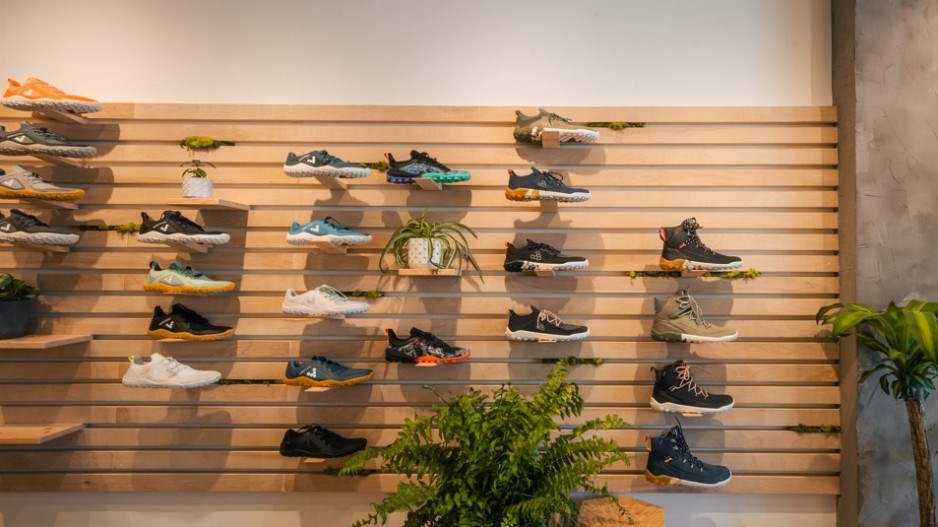Shoemaker Vivobarefoot opened its first store outside Europe and the Middle East in Vancouver last week, and plans to roll out stores in Tokyo, New York and possibly Toronto and Boulder, Colorado later this year.
The London, England-based chain plans to locate stores in either major international hubs, or in cities such as Vancouver, which are known for having residents being active in outdoor activities, Vivobarefoot's general manager for the Americas and Asia Pacific Cedric Scotto told BIV.
He said the store's 2190 West 4th Ave. location was ideal because of its high foot traffic and its collection of outdoor-oriented stores and athleisure retailers.
A Lululemon is across the street from the store while an Arc'teryx store is kitty corner. .
What makes Vivobarefoot different from other shoe retailers is that its shoes are designed to fit the natural form of feet. That means that the shoes are wider than regular shoes and do not come to a point, which would scrunch toes. The soles are also thinner so that people wearing the shoes can feel the ground beneath their feet much more than if they were wearing normal shoes.
Scotto, who has a background in biomechanics and has done a lot of research on running gaits and barefoot shoes, explained that there is ample science that shows that wearing shoes with thin soles can help wearers' body health.
"After using our shoe for a certain some certain amount of time, you do gain about 60 per cent of the strength in your feet because there's lots of muscles in the foot," he said. "That's part of how being thin and flexible really allows for the foot to move and work."
The store's range of shoes include some for hiking and trail-walking but also some dress shoes made from leather that can take a polish.
Scotto said that the plan in the next year is to roll out foot scanners in stores so customers can get a scan and custom-order shoes made specifically for their feet. The off-the-shelf shoes sell for between approximately $260 to $432. Scotto said he was not sure how much more his company would charge for custom-made shoes.
He said the company's revenue last year was about $85 million, and the expectation is that the company will generate about $118 million in sales this year.
About 85 per cent of the company's global sales are online, and Scotto said he expects that to continue. The new bricks-and-mortar stores are intended to expand brand recognition and give people a better idea of what the shoes look and feel like.
The company only operates one corporately owned store, in its home base of London, England, where two cousins founded the venture in 2012.
The other 17 stores are in Europe, except for one store in Israel, and are owned and operated by distributors who buy the shoes at wholesale prices and own territories. Scotto said Canadian sales represent less than 10 per cent of global sales.
Andrew Bentley has for years owned and operated Vivobarefoot ÎÚÑ»´«Ã½ and is responsible for all channels. That includes the new branded stores in ÎÚÑ»´«Ã½, online sales and wholesales to third-party sellers such as Breathe Outdoors, The Foot Collective and Distance.
He told BIV that he has hired six people to run his West 4th Avenue store and may hire more people if he finds appropriate candidates who are inspired by the brand.
"We found a great relationship with [Chip Wilson-owned] Low Tide Properties, who is the landlord for the property," he said. "They have been so incredible in terms of just helping us and guiding us."
Other brands that recently opened on West 4th Avenue similarly told BIV that part of the attraction of the neighbourhood was that it is seen to be an outdoor hub. Sometimes the relationships between those store owners is friendly. Other times there is antagonism.
After Adidas opened its first Terrex store outside Germany on the strip in December, BIV asked Adidas ÎÚÑ»´«Ã½'s vice-president of retail, Lesley Hawkins, if she feared that Arc'Teryx would launch a lawsuit because the store's name was similar and both stores sold outdoor wear.
"The Terrex brand has been around since the '80s," she said in January. "I understand that there is some similarity in the names, but Terrex has existed for a long time."
While the Terrex brand may have been around for decades, it did not open any stores until November 2021, when it opened in Munich, Germany.
Arc'Teryx' parent Amer Sports then , alleging that its Terrex brand was infringing on Arc'Teryx's trademark in its stores and online channel.
The lawsuit claims Adidas’s use of the Terrex brand has “directed public attention to its services and business in such a way as to cause, or likely to cause, confusion in ÎÚÑ»´«Ã½ with the services and business of Arc’teryx.”



